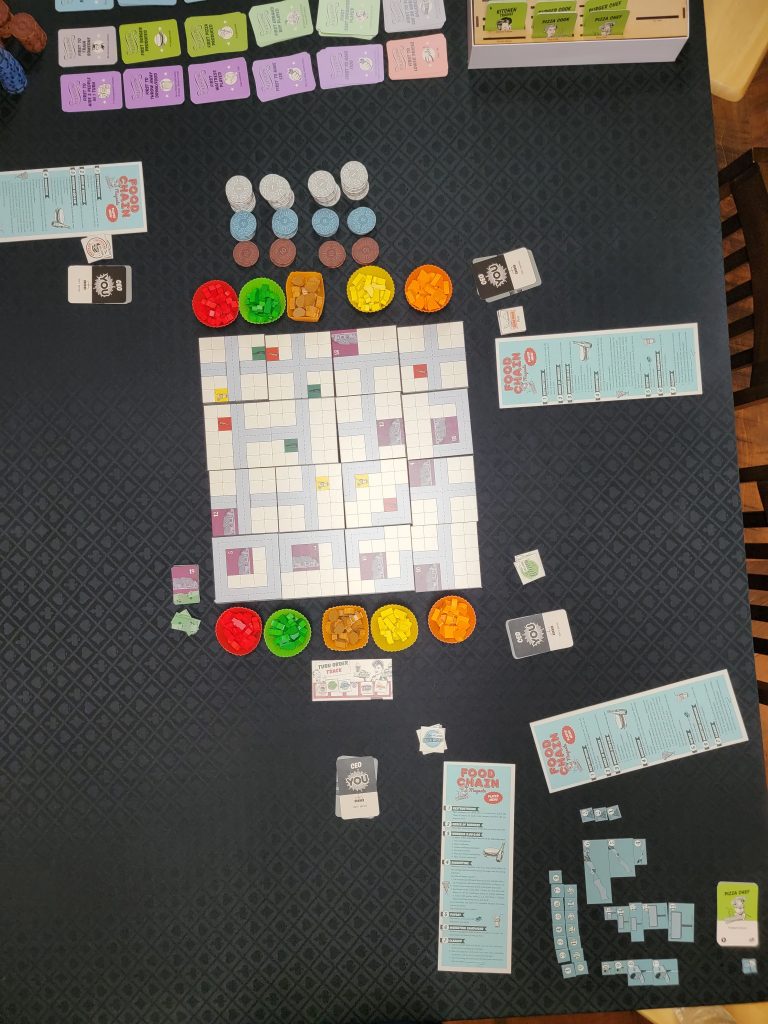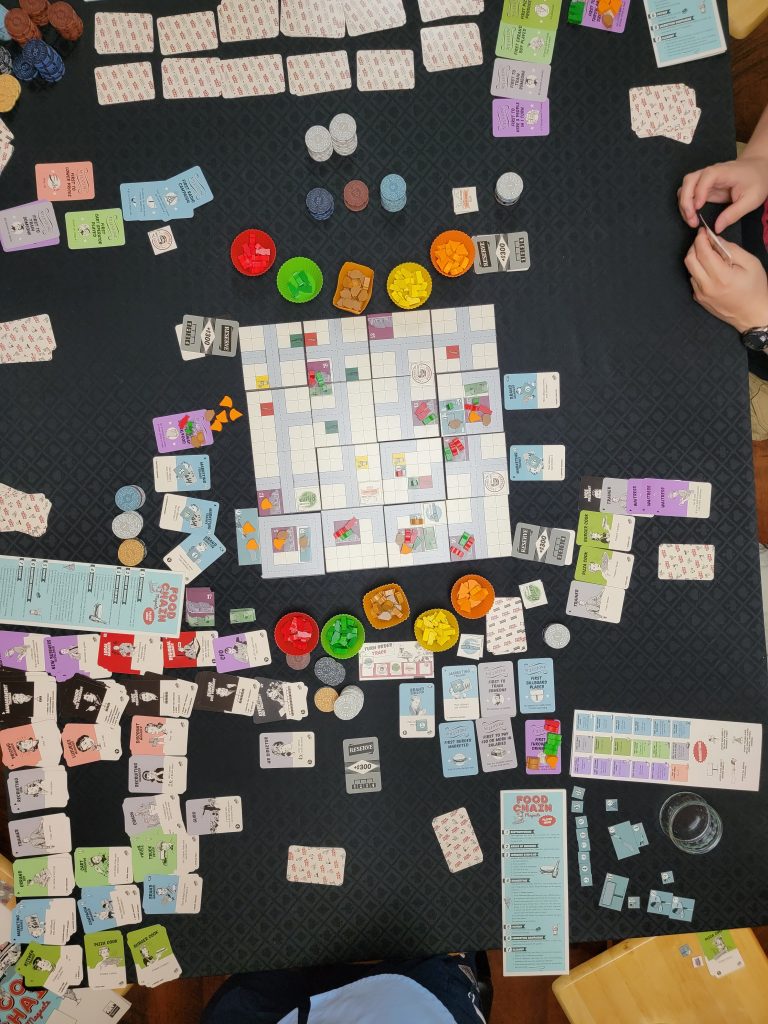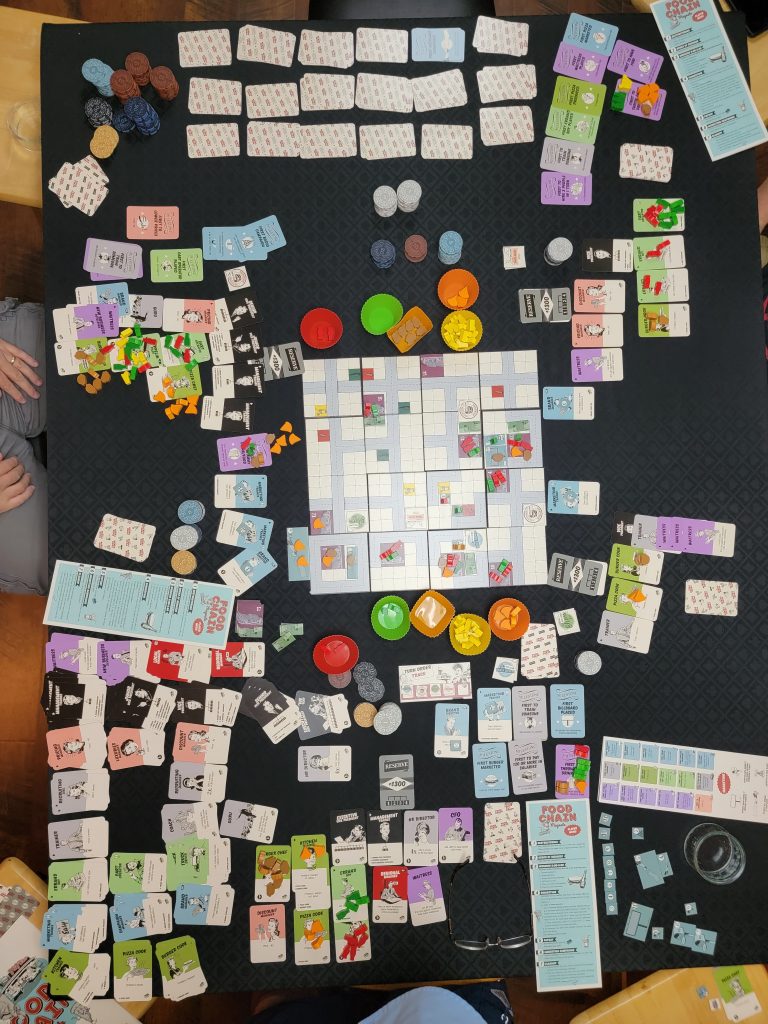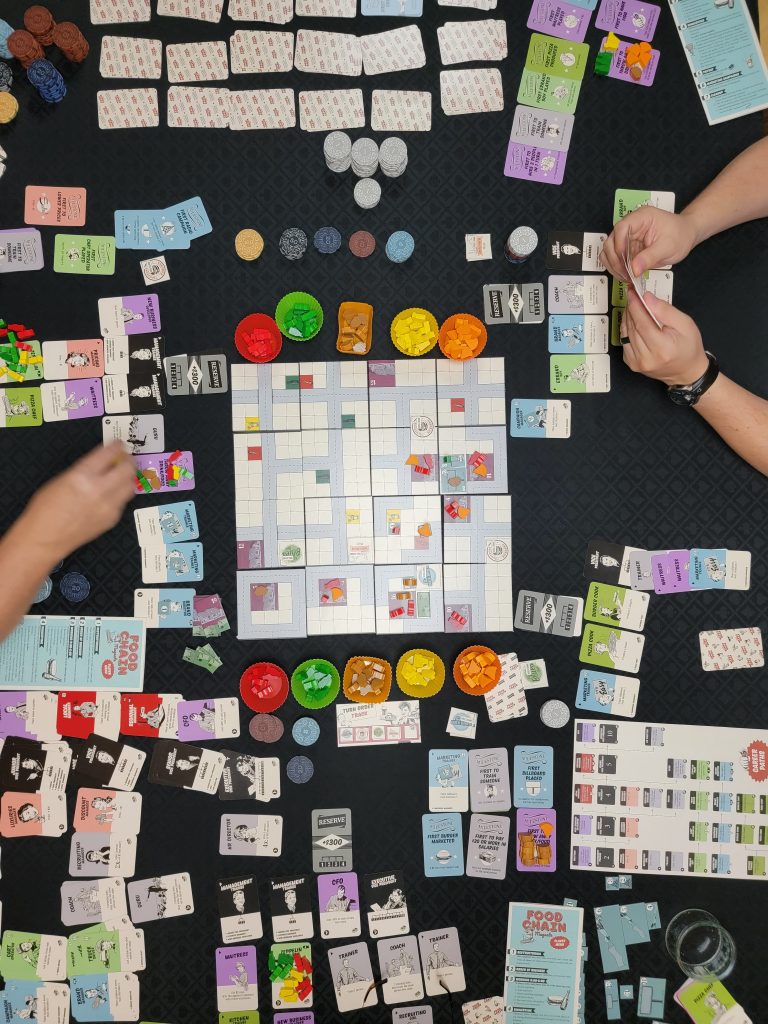The Games You Want to Play…Food Chain Magnate
Chuck (Santa Maria Pizza or “SMP”), Doug (Duck Diner or “DD”), James (Xanga Blues Bar or “XBB”), and Scott G. (Gluttony Inc. Burgers ‘GIB”) sat down to play a learning game of Food Chain Magnate. The only player with any experience was Doug, who had played a couple of times in the last year.
This game is very highly thought of, but its perceived complexity seems to present a high barrier of entry to those wanting to play. Visually, the display of cards can be intimidating. Even our group, which does not shy away from the complex or heavy (I present 18xx, Twilight Imperium, Eclipse, Here I Stand, COIN, etc. into evidence), had not been in a hurry to play it. It may be that part of that had to do with the perceived complexity and part, perhaps, the relatively drier business focus of it (though, we have enjoyed the previously mentioned 18xx games).
We discovered that, though the game is very deep and there is a lot to manage, the mechanics are not that complex. Once we had Restructuring and Dinnertime down (with a basic understanding of the other concepts), we were able to run the game off the Menus (player aids), only needing to refer to the rules for a few questions and how to implement the more advanced advertising techniques. Having stated that, it cannot be said that the game is easy to play. There are so many options to consider and ways for your competition to impact your restaurant, you cannot rest easy.

Map setup is supposed to be random, but this was a tough board for new players. Although we made some changes to make it more playable (making at least some of the streets connect), as you can see from the pictures it was not a balanced board. The houses were concentrated along two of the sides and a quarter of the board had only drinks to offer and no houses. This was a little snug for four players and forced one of the restaurants into a tight spot with nearby houses that were not well located for billboards, which will definitely tamp down early growth. After the game, Chuck found a site, www.BoardgameHelpers.com, that has a service that randomizes board setup – including a choice for balanced boards that we will use in the future.

We found that the game was not forgiving of a poor location (or a poor map) and a rough start can doom a player early in the game. However, in a normal situation, it seems that comebacks are quite possible. At different points throughout the game, it appeared that one player or another had a dominant position, only to go a turn without earning any cash during a particular Dinnertime as competitors compensated.
Our initial thought was that the game could be jump-started with each player having some employees at the start, rather than going through the process of the turns to hire them. We all made the same move on Turn 1, going with a Recruiting Girl. However, as early as Turn 2 and 3, strategies began to diverge. Since early plays could be made for milestones, we could see why the game requires players to step through those early choices – though we are keeping our eyes open for a shortcut.
As follow-up to our discussion about whether it would have been good for the game to start the players with certain employees, we were debating how many obvious opening moves there might be. Based on the closeness of the finish, we feel there were at least two, if not three, separate routes to victory.
One of the reasons this game is intriguing is that although the mechanics are fairly straightforward (not simple, but as noted earlier once you have grasped the Restructuring and Dinnertime concepts, it seems that you can run the game off the player aid and the cards with just a few exceptions), the average gamer cannot just look at it and wrap your head around all of the possible outcomes.
The number of possible development paths can seem almost bewildering at first, though you start to get a better feel for which choices are important and which need to happen before the others. There are certain milestones (like the one that gives a $15 discount on salaries) that appear to be must-haves for beginners and dictate certain choices in the early rounds. Other than those, it does seem like there are many different paths to victory and, with enough plays, alternate paths that would let you not need to have to have those milestones, but it’s not obvious to me now.
The players start without any cash and the initial bank has $50 per player. Once that initial bank is exhausted, cards that the players secretly selected at the beginning of the game are revealed (each selected one card from three choices) and the bank is re-loaded based on the total values revealed. Since the length of the game is determined by how much goes into the bank, players can influence the game’s outcome based on their combined selections and choose strategies to take advantage of a shorter or longer game. Also, these cards can determine whether CEO’s become more or less effective (two or four reports) or remain as effective as they were at the start (three reports). Victory at the end is determined by the total money each player has.

Gluttony Inc. Burgers or “GIB” (Scott G.) started with a good advertising campaign and quickly generated demand for its first restaurant from two houses. Later, it opened a second restaurant a couple tiles over and began competing more directly with Duck Diner. Mainly a pizza joint with some burger offerings (despite its name), it was early into the drink market and its location near suppliers gave it an advantage. It was a leader in marketing with well placed billboards, early mail campaigns, and the first radio ads. GIB ended the game with a number of milestones – radio campaigns that market two goods (GIB was first to on the airwaves), no salaries for marketeers & eternal marketing, +$5 for every drink sold, +1 range for drivers, -$1 price, and a $15 discount on salaries. Key Competitive Advantage: Strong Marketing.
Duck Diner or “DD” (Doug) focused on a smaller neighborhood than GIB did and marketed to a single house until the arrival of its Regional Manager allowed it access to other markets. However, that house quickly added a garden and became a major source of revenue. DD was focused on burgers and was a little late to the concept of adding drinks to its selection and suffered a couple of times when it was unable to attract drinkers to the restaurant. However, it was dominant early in the burger market and never really gave up that lead. It was a little slow in the discount market, also, but managed to turn that around by the end of the game and was able to compete on price. Near the end of the game, though, SMP pushed into its market and captured business from the local neighborhood. DD managed to grab a couple of valuable milestones along the way – First Billboard Placed (no salaries for marketeers & eternal marketing, which mean when you place marketing you cannot change it – potentially a bit of a double-edge sword there), the $15 discount on salaries, a freezer that allows you to store 10 goods, using multiple trainers on the same person, and +$5 for every burger sold. DD was a leader in HR with a CFO, an Executive Vice President, and a Regional Manager. It also followed GIB into the radio business. Key Competitive Advantage: Strong Staff.
Santa Maria Pizza or “SMP” (Chuck) was, as its name implied, a leader in the pizza business and controlled at least one house consistently, was regularly able to attract business from one of the houses near XBB, and was often able to poach some business from DD’s main market. SMP was a leader in airplane advertising. On the last turn, DD managed to beat SMP in the competition for DD’s primary house of business, which SMP had grabbed in the penultimate turn, changing the outcome of the game. The company led in a number of milestones – it was first to hire 3 people in a turn giving it 2 management trainees, it had the $15 discount on salaries, each of its buyers got +1 drink from each source, was the first to produce pizza and gained a pizza cook, played the first waitress giving +$2 for each one, marketed the first pizza giving more money for each one sold, had a freezer, and his CEO was a CFO (CFO doubles your income from each sale during a turn when in play). Key Competitive Advantage: Industry leader.
Xanga Blues Bar or “XBB” (James) found itself in a tight spot at the start of the game. One of its house was could not be touched by billboards or mail and SMP beat it to the punch with billboards at the other nearby house (until later in the game when XBB was able to market burgers to it). This location put XBB in a tough spot for the entire game and it soon found itself short on money, unable to compete effectively for milestones, and trouble staffing properly. Although late in the game it was able to gain some traction with nearby houses, aggressive marketing by air and radio found it having trouble meeting demand since it could not produce enough to meet all of its customers’ demands. Key Competitive Advantage: Persistence in the face of Adversity.
Congratulations to Scott G. for his victory with $558, Doug was second with $435, Chuck finished in third with $427, and James came in fourth.

As mentioned above, there are so many options that the restauranteur may miss an opportunity (or a dozen) throughout the game. One example, of many possible examples…If you look at the end-game picture, you can see that had Doug’s Regional Manager built a restaurant in Scott’s backyard (their restaurants open immediately) on the block behind Scott’s original restaurant on the last turn, it might have changed the outcome. Everyone missed opportunities, but that one moment was a good example of what might have been for just one player. As it was, Doug only exceeded Chuck’s score by $8 (and was sure Chuck had beaten him, but Doug managed to grab his one house that last turn). As of that last turn, it seems that any one of the leading three players could have won the game – they were all three competitive, at least – with just a couple houses changing hands.

That’s brilliant! I hope all your friends want to try it again and see the potential and crunchyness in repeated plays.
I just taught a few friends this last night and they now understand all the possibilities. I’m looking forward to playing it again 😃
Yes,
We are looking forward to playing again soon! It seems like there is a lot of re-playability. We do not have the ketchup expansion. Have you played using that? If so, is it worth it?